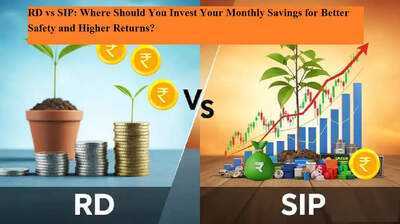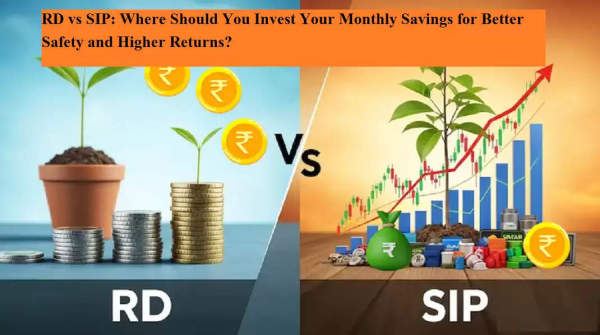

Saving a fixed amount every month is a common financial habit in most Indian households. Traditionally, Recurring Deposits (RDs) have been the go-to option — simple, safe, and predictable. But in the last decade, Systematic Investment Plans (SIPs) in mutual funds have become a preferred alternative for those looking to grow wealth faster.
So, when it comes to investing your monthly savings, which is better — RD or SIP? Let’s break it down to help you make the right choice.
RD vs SIP: Understanding the BasicsRecurring Deposit (RD):
An RD is a fixed-income investment offered by banks and post offices. You deposit a fixed amount every month, and the interest rate remains constant throughout the tenure. It’s risk-free, and at maturity, you receive both your principal and the accumulated interest.
Systematic Investment Plan (SIP):
SIP, on the other hand, allows you to invest small amounts in mutual funds, typically equity or hybrid schemes. While SIPs carry market-related risks, they also have the potential to deliver significantly higher returns over the long term.
| Investment Type | Bank or Post Office | Mutual Funds |
| Return Type | Fixed and Guaranteed | Market-linked, Variable |
| Risk Level | Very Low | Moderate to High |
| Lock-in Period | Fixed (6 months to 10 years) | Flexible, No fixed period |
| Average Returns | 6–7.5% per annum | 10–15% (long term average) |
| Taxation | Interest fully taxable annually | LTCG tax of 12.5% after 1 year; ₹1.25 lakh gain exempt |
| Ideal For | Safe, short-term investors | Long-term, growth-focused investors |
| Withdrawal | Allowed with penalty before maturity | Partial or full withdrawal anytime |
RDs typically offer 4–7% annual returns, which often just about keep up with inflation. SIPs, however, have a different game altogether.
Well-chosen equity mutual funds have historically delivered 10–15% compounded annual growth over 5–10 years. In several cases, SIP investors have earned 15–20% returns during favorable market cycles.
In short, RDs help protect your capital, while SIPs help it grow meaningfully — provided you invest for the long term and choose the right funds.
Tax Impact: The Real DifferenceEarning returns is one thing, but what matters most is how much you keep after tax.
In RD, the interest is fully taxable every financial year as per your income slab — even if the deposit hasn’t matured yet.
In SIP, tax is applicable only at redemption. If you stay invested for over a year, you pay just 12.5% Long Term Capital Gains (LTCG) tax, and gains up to ₹1.25 lakh annually are tax-free.
Moreover, if you invest in ELSS (Equity-Linked Savings Schemes) via SIP, you can also claim tax deductions under Section 80C, adding another layer of benefit.
Risk and Personality FitYour investment choice should align with your risk tolerance and financial goals.
If you prefer stability and don’t want to see your balance fluctuate, RD is ideal.
If you can handle short-term volatility and aim for long-term wealth creation, SIP is the smarter pick.
When markets are volatile, RDs provide peace of mind. But SIPs reward those who remain patient during market ups and downs — turning volatility into opportunity through rupee cost averaging and compounding.
Which One Suits Your Goals?Short-term goals (up to 3 years): Choose RDs for goals like buying a car, funding a wedding, or building an emergency fund. They are stable and penalty-protected.
Long-term goals (5 years+): Go for SIPs if you’re planning for children’s education, retirement, or wealth creation. The longer you stay invested, the stronger the compounding effect.
Experts suggest not to treat RD and SIP as rivals, but as complements. A smart approach is to use a “Core and Satellite” strategy:
Make RD your core investment, offering stability and liquidity for short-term needs.
Treat SIP as your satellite investment, designed for long-term growth and wealth creation.
This balance ensures your investment journey is both safe and rewarding — combining security with growth potential.
Bottom LineIf you want guaranteed safety, RD fits the bill.
If you aim for faster wealth creation, SIP is your best bet.
And if you want the best of both worlds, maintain a mix of the two.
Whatever you choose, stay consistent and review your portfolio regularly. Remember — financial discipline matters more than market timing. Start small, stay patient, and let your savings grow steadily toward your goals.
Disclaimer: The information provided here is for educational purposes only. Mutual fund investments are subject to market risks. Always consult a certified financial advisor before making investment decisions.